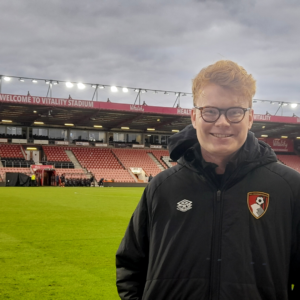
Josh Brown graduated with BA (Hons) Politics, Philosophy and Economics in 2020. He’s currently Academy Analyst for Arsenal FC.*
What have you been doing since leaving Exeter, and what are you doing now?
Since leaving Exeter, I completed an MSc in Sports Performance Analysis at the University of Chichester alongside work at Millwall Football Club, before being recruited to join AFC Bournemouth as an Academy Analyst. My job essentially is to support academy footballers across the age groups by providing statistical and video analysis of fixtures and training, and with the full-time pros, helping to acclimatise them in an elite sporting environment by providing pre- and post-match analysis of opposition and fixtures.
“I always loved sport, and I knew I wanted a job that was dynamic, fast-paced and rewarding – and football analysis matched this up with my academic strengths”
Why did you choose this career? And what do you enjoy most about your work?
I always loved sport, and I knew I wanted a job that was dynamic, fast-paced and rewarding – and football analysis matched this up with my academic strengths, so seemed a natural progression from my undergraduate degree. I love the fact that my work involves such close contact with professional players and coaches – I find myself questioning a lot of what I assumed to be true about football after conversations at work – and as a result, that I can feel myself developing my knowledge of the elite game rapidly. In such a tight-knit environment, relationships with players is fundamental to any success, and I consider myself very fortunate that I’ve worked with brilliant sets of players across both clubs I’ve been at.
“I find myself questioning a lot of what I assumed to be true about football after conversations at work – and as a result, that I can feel myself developing my knowledge of the elite game rapidly.”
Were a member of any societies, groups or sports clubs?
I was part of Exeter University Men’s Cricket Club for two seasons, playing BUCS fixtures in the summer, and was also Sports Editor at Exeposé for two years. I was also fortunate enough to work for Exeter City FC in a voluntary media capacity, which was fantastic exposure into professional football and I was lucky enough to meet people at the Club who shaped my career ambitions.
What did you enjoy most about your programme and what was the biggest highlight?
I enjoyed that I was able to study such a variety of modules – I studied everything from the Philosophy of the Body and Mind to the Changing Character of Warfare. It allowed me to pursue my own interests, and studying three academic perspectives simultaneously meant I developed an ability to understand topics through a multi-disciplinary approach – something I’ve found invaluable in my professional working life.
What did you enjoy most about studying at Exeter?
The best thing for me about studying at Exeter was that I could get everything I wanted out of the University experience – the academic side was as challenging as I wanted it to be, but I also had the time to pursue my extra-curricular interests such as playing competitive sport. Being able to work in world-leading facilities on Streatham campus was an experience I won’t ever forget.
“Being able to approach topics from a multi-disciplinary perspective has been essential in my work; being able to examine player development across a spectrum of spheres – from sports science, to coaching, to analysis and education – has given me a really well-rounded platform to for my job.”
What skills and experiences have been most useful for your career?
Being able to approach topics from a multi-disciplinary perspective has been essential in my work; being able to examine player development across a spectrum of spheres – from sports science, to coaching, to analysis and education – has given me a really well-rounded platform to for my job. I also find the analytical process that my experience at Exeter helped develop has been important in helping me place football in the wider social sphere – it was a topic I explored in my dissertation, but find myself constantly referring to in debates about football.
What advice would you give to a current student who wishes to pursue your career?
Firstly, get networking – LinkedIn is absolutely vital in accessing others in elite sport, who typically aren’t as publicly available as (for example) big firms in other industries, who likely have graduate schemes or other programmes that provide a pathway into employment. Football can be a very nepotistic industry to work in and without connections it’s almost impossible to get anywhere! Secondly, get writing – football analysis in particular is – for me – about being able to say 100 things about 1 team, not 1 thing about 100 teams. The best way to explore these ideas is longer-form writing, ideally integrating data, video and visuals into articles. I read a lot outside of my working hours, and I know staff at other clubs who have been hired off the back of their self-published work – so it’s the best way of getting noticed. Most of the time, it’s not necessarily about the argument you’re making, but how you make it.
“Firstly, get networking – LinkedIn is absolutely vital in accessing others in elite sport. Football can be a very nepotistic industry to work in and without connections it’s almost impossible to get anywhere! Secondly, get writing – football analysis in particular is – for me – about being able to say 100 things about 1 team, not 1 thing about 100 teams.”
What are your plans for the future?
I want to progress into working within an elite first-team environment in the Premier League, or another elite European league.
*At the time of writing this content Josh was working for AFC Bournemouth, but moved to Arsenal FC in September 2022. Congrats on your new job!
